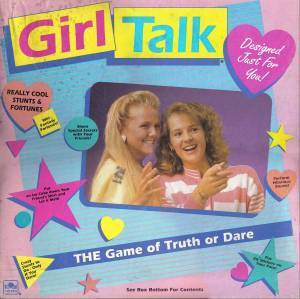
Male readers, you may just have to bear with me on this one. Actually, maybe you should use this as a welcome opportunity to bask in the notion that board games targeted at your demographic did not limit your life goals to princessery and shopping. You guys got to be ninjas and surgeons and we got to worry about getting a zit before our dates. And you wonder why we don't have a woman president yet. She'd probably get a zit before the big inaugural ball and concede. Damn you, Girl Talk, and your powerfully brain-dead life lessons.
I'd like to say this was an isolated phenomenon of archaic norms, and it was what I was planning on saying until I took a stroll down the toy aisle today at Target. Lo and behold, High School Musical Dream Date. That's So Raven Girl Talk. Hannah Montana Mall Madness. As if the frighteningly stereotypical girly game offerings weren't morally void enough, we've added new corporate sponsors and Disney tie-ins. Ah, the sweet scent of moral apathy. Now that's progress.
This genre were certainly not exclusive to the 80s and 90s, though it is more surprising that we upheld such outmoded norms this late in the game (some pun intended). With an increasing focus on gender equality, it seems that game producers chose to ignore any feminist progress and steer us straight toward the mall where they felt we belonged. All we needed was a fake credit card and some plastic crowns and we'd be back on track in no time.
Here is a light (pastel, if you will) selection of the games that kept girls beneath the plastic ceiling* of legitimate board game accomplishment:
Girl Talk
Girl Talk was a sort of innocent-ish truth or dare game that came with preset questions in board game format. It was also a teeny bit like MASH, as our accumulated points won us "fortune cards" that told of our future. Of course, according to Girl Talk, the future we yearned for was focused on marriage, career, children, and so-called "special moments". I'd like to give them some credit for including career, but if the game saddled you with a deadbeat husband and 12 kids, you were pretty stuck.
It being a parent-sanctioned game, the questions and dares were pretty tame. Dares included tasks like "Call a local radio station and dedicate a song to a boy you like!" "Make a prank phone call and hang up!" or "Lap water out of a bowl like a dog!" If you failed to perform the dares, you had to don a bright red zit sticker. On the plus side, if you agreed to be scorekeeper you were to be addressed as "Point Princess". Overall, not a bad deal.
Mall Madness
I know I've ranted on this one before, but it's so truly deserving of relentless bashing. Very few games are so shameless in their complete disregard of all things morally grounded. Mall Madness not only takes the cake on that one, it teaches us to put it on our credit card. We raced around chasing sales and scrambling back to the ATM for cash, which is just what 9-year old girls should be learning about.
The electronic version gave us an eerily disembodied voice, cheerily delivering commands to us. My all-time favorite is "You left your lights on! Go to the parking lot!" Now we're not only frenzied consumers, but vapid ones at that. It's only a few notches up from Teen Talk Barbie's "Math is hard!" and that's being generous.l
For the full post on Mall Madness, click here
Pretty Pretty Princess
This was amongst the most coveted of little girl games, teaching us at a young age that it's okay to play games as long as you end up with some jewelry. Many of us went on to build romantic relationships on that very notion.
The object of the game was to be the first player to collect our designated color of ring, earring, bracelet, and necklace plus the almighty crown. That damn black ring would always thwart our well-intentioned efforts, so we'd have to pawn it off on someone else in order to win. I'm not sure if there was any actual educational value to this game, but it did teach us how to cunningly set up our friends for failure.
Girl Talk: Date Line

I will admit that this game had me totally fooled. I thought that they'd come up with some fantastic technology that somehow converted my boombox cassette player into a predictor of romantic matches. You'd put a boy card and a girl card into this mysterious contraption and a conversation would play from the tape to see if it was a match or not. Only later did I discover that if I played the tape without plugging in that stupid little pink box, it had the exact same conversations. Obviously Milton Bradley doesn't think very highly of young girls if they thought we'd play this over and over again without growing suspicious. Then again, they had me fooled, so maybe they were right on.
Electric Dream Phone
In an age before all 8-year olds had cell phones, this game was awesome, if only because we briefly got to pretend we had our very own phones. It was kind of like Guess Who, only for squealing boy-crazy little girls eager to call up some totally buff hotties. We all went out in search of our secret admirers, though sometimes our hints were not so secret if someone pulled that speakerphone card. We all crossed our fingers to hear the magic words, "You're right! I really like you." We'd spend the better part of our teen years trying to replicate that thrill.
Girl Talk Secret Diary:
 I know, I know. How many versions of this game were they going to release? The correct answer was "as many as naive young girls will blindly consume", translating to quite a few. Each one more brainless and boy-crazy than the last, many of us nevertheless adored these games. This version was sort of a cop out, as it was admittedly less involved. It came with a massive diary of some girls secrets. We were supposed to care about them for some reason or other, plus it forced us to divulge our own. It was basically like a confessional with less priest or Real World staff, depending on how you look at it. That is, whether you were raised Catholic or by TV. Just in case you needed clarification on that one.
I know, I know. How many versions of this game were they going to release? The correct answer was "as many as naive young girls will blindly consume", translating to quite a few. Each one more brainless and boy-crazy than the last, many of us nevertheless adored these games. This version was sort of a cop out, as it was admittedly less involved. It came with a massive diary of some girls secrets. We were supposed to care about them for some reason or other, plus it forced us to divulge our own. It was basically like a confessional with less priest or Real World staff, depending on how you look at it. That is, whether you were raised Catholic or by TV. Just in case you needed clarification on that one.These may not have been the most enlightened toys on the market, but that didn't stop us from going after them like a pack of shopping-crazed jewelery-adorned date-seeking wolves**. We might not have come out from them smarter or better or stronger or...what was I saying? Oh yeah, these games were pretty worthless, but we loved them all the same. We're all probably a bit more superficial and vapid for it, but at least we've got the balls to cluck like a chicken when Girl Talk tells us to. If nothing more, our subconscious avoidance of zit stickers will serve us well in life. I know it keeps me on my toes.
*I was going to say glass ceiling, but no toy company would have included glass in any of their products. Their lawyers would never go for it.
**In other words, not like wolves at all






















